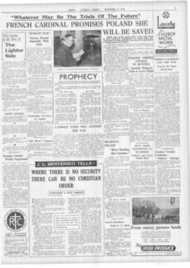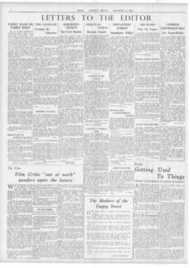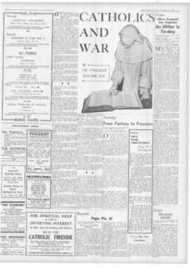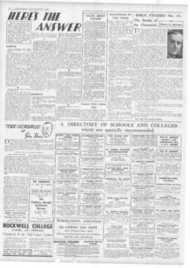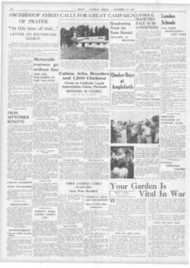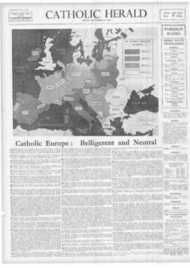Page 2, 15th September 1939
Page 2
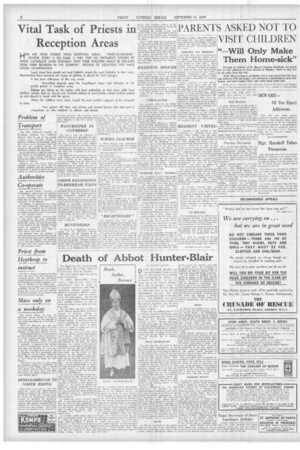
Report an error
Noticed an error on this page?If you've noticed an error in this article please click here to report it.
Tags
Share
Related articles
Abbot Hunter-glair
Loch Ness Monster: Its Match In St Columba
Oscar Wilde Saw The Stone Laid
Abbot Thomas Erkenwald Egan, O.s.b.
Any Year Is Noteworthy Which Brings Among Its Events A
Death of Abbot Hunter-Blair
The Right Rev. Sir David Oswald Hunter-Blair, Bt., titular Abbot of Dunfermline, died on Tuesday. His state had for some time given cause for anxiety. In Abbot Hunter-Blair there passes a man of wide travel and acquaintance, rich in social as in religious experience, and with a
wonderfully retentive memory upon which he could call at will for a seemingly inexhaustible store of reminiscences and information. Into his old age he remained active with the pen, his later writings showing no sign of weakening powers over those of many years ago.
The late Abbot was born in 1853, son of Sir Edward Hunter-Blair, the fourth baronet of Dunskey, whom he succeeded in the title in 1896. He was educated at Eton, and at Magdalen College, Oxford. At the University, his friends included that wayward genius Oscar Wilde, about whom he wrote much in a paper forming part of his volume, In Victorian Days.
In 1870, the year of the fall of the Temporal Power, David Hunter-Blair was in Rome. There he took part in the eventful " Venti Settembre " as a voluntary helper; for while the enemy was literally at the gates, the young Scotsman was aiding in the work of conveying the wounded to hospital. For himself, however, his most important day in the Eternal City came some years later. At the church of Sant' Alfonso, on the Esquiline, he was received into the Church on Lady Day, 1875; the day was also Maundy Thursday, so " Our Lord was in Our Lady's Lap." In the following year he was made a Privy Chamberlain of Sword and Cape to Pope Pius IX, an honour renewed under Leo XIII until 1878, when its subject took the monastic habit as a Benedictine.
Professed in 1880, Abbot Hunter-Blair was ordained in 1886. From 1890 until 1895 he was rector of the Abbey School at Fort Augustus. From there he returned to Oxford, in the capacity of Master of the house of studies for University etudents belonging to the Order. The status of such houses at that time required that they should bear the Master's name, so " Hunter-131air's Hall "—now St. Benet's Hall—was the Oxford address.
At Oxford Sir David remained until 1908. A few years afterwards we find him as Prior of Fort Augustus, and then, during the period 1913-18, Abbot of the same house. On relinquishing that office he was made titular Abbot of Abingdon, and finally, in 1921, of Dunfermline.
As a writer Abbot Hunter-Blair has left a considerable output. Recollections of a long life came in the series of books which produced A Medley of Memories; A New Medley of Memories; Menories and Musings; A Last Medley of Memories; In Victorian Days. There were also the chapters of varia consisting Flying Leaves, and Little
Essays. In deeper vein we may include the Abbot's translation of Bellesheim's History of the Catholic Church in Scotland; his book on John Patrick, Third Marquis of Bute; and The Rule of Our Most Holy Father St. Benedict. For the Catholic Encyclopredia he wrote upwards of seventy articles, biographies, historical notes, etc. In the Catholic Press he was voluminous and entertaining: " Nestor " was a pseudonym at the head of much good reading; and scores of articles appeared under his own name. As a letter-writer also, he contributed to various newspapers interesting matter from his well of recollection.
Abbot Hunter-Blair knew at first hand many countries. He had journeyed extensively in Europe and also in Latin America, These travels gave him material for many informing pages in his books.
By PETER I.J.N.,s().v DAVID HUNTER BLAIR was born at Donskey Castle, on the edge of the rugged Wigtownshire cliffs overlooking the Atlantic, on September 30, 1853. He was the eldest sou of Sir Edward HunterBlair, Bt., or Dimskey, whom he succeeded in 1896. On both sides he was descended from a long line of distinguished ancestors who had taken a prominent place in Scottish affairs. His childhood was mostly spent on his father's other estate of Blairquhan, Ayrshire, and he was educated at Eton and Magdalen College, Oxford. While still an undergraduate he Ivas drawn towards Catholicism, and he was received into the Church at Rome. by Fr. Edward Douglas, C.SS.R., in 1875. Having obtained
his university degree he found himself a very rich Catholic layman, and it was expected that he would make a brilliant marriage. As he tells us in his memoirs there was many a Catholic mother who viewed him as an eligible son-in-law! But his vocation lay in another direction.
PRIVY CHAMBERLAIN The year after his conversion he was nominated Privy Chamberlain of the Sword and Cloak to Pius IX, and carried out his regular periods of duty in Rome for two years, being present at the election of Leo XIII. He was also a Captain in the Ayr and Wigtown Militia. Few people are alive to-day who remember his immense benefactions to the Church in Scotland. He was responsible for the erection of at least four churches in the Galloway diocese, and it is often forgotten that it Was his money that paid for the greater part of the monastic buildings at Fort Augustus. Abandoning all prospects of a secular career, he received the Benedictine habit in this Highland monastery, which had been opened a few months earlier, in the autumn of 1878.
Brother Oswald—as he was now called—spent his novitiate at the cathedral priory of Belmont, near Hereford, then the common novitiate for the English Benedictine Congregation. He was professed in 1880 and ordained priest six years later. Almost immediately he was appointed to the staff of the abbey school at Fort Augustus, of which he was headmaster from 1890 to 1895. But during the holidays he found time for preaching engagements. visits to his many friends, and also for such serious work as the translation from the German of Bellesheim's learned History of the Catholic Church in Scotland.
BRAZIL In 1806 he responded to the appeal made by Leo XIII to the Benedictine Order to send monks to the help of the almost defunct Benedictine abbeys in
Brazil, so that the monastic life might be revived there. He remained in Brazil for nearly two years, engaged r, teaching, as well as carrying out an apostolate among the British residents.
On his return to England he was placed in charge of the first Catholic House of Studies to be established at Oxford. As Master of Hunter-Blair's Hall he became a well-known and popular figure in university life. The long vacations gave him plenty of opportunity for travel, and, as may be proved from his memoirs, he kept in touch with his vast circle of friends. It can be said that there was scarcely a country mansion in Great Britain where Fr. Oswald Hunter-Blair was not persona grata.
ABBOT In 1912 he was recalled to hie monastery as Prior, and the following year he was elected Abbot. He immediately threw himself into the task of building the choir of the abbey church; nothing having been done to complete the building since the foundations were laid some twenty years previously. In spite of endless difficulties duo to the Great War the choir and Blessed Sacrament chapel were completed and opened in 1916.
Abbot Oswald resigned his office in lfil8 and took up his residence with the Benedictines on the Isle of Caldey. Here he acted as librarian, and in many other ways took a keen interest in the life of this convert community, of whose " constant and unfailing kindness " he writes so gratefully in his first Medley of Mem.ories. He spent nearly two years on this sea-girt island, followed by another visit to Brazil, after which he retired to Belmont Abbey.
But as he grew older it seemed impossible for him to stay very long in any one place: his mind was so active and hie energy of body so remarkable for a man of his age that he was perpetually on the move. Finally he established himself at the New Club, Edinburgh, and it was here that he spent the greater part of his latter years.
LITERARY OUTPUT His literary output was amazing, for in addition to nearly always having a book on hand he turned out regular weekly articles for Catholic weeklies and magazines. not to mention long letters on almost every conceivable subject to the secular Press. He was a first class journalist with a ready pen and a keen sense of humour.
His three volumes of memoirs will take their place as an invaluable source of information for all students of social life in the latter part of the nineteenth and the first half of the twentieth centuries. Perhaps their most remarkable feature is the entire absence of any malice or uncharitableness in this rare brilliancy of gossip. These three books also have a real apostolic value in revealing to non-Catholic readers a great deal about the more intimate life of the Church and in breaking down prejudice. Abbot Oswald could write about almost any subject, as may be proved by the seventy articles he contributed. to The Catholio Encyclopeedia,
blog comments powered by Disqus




